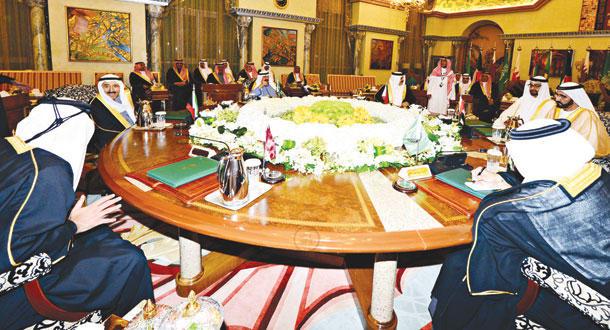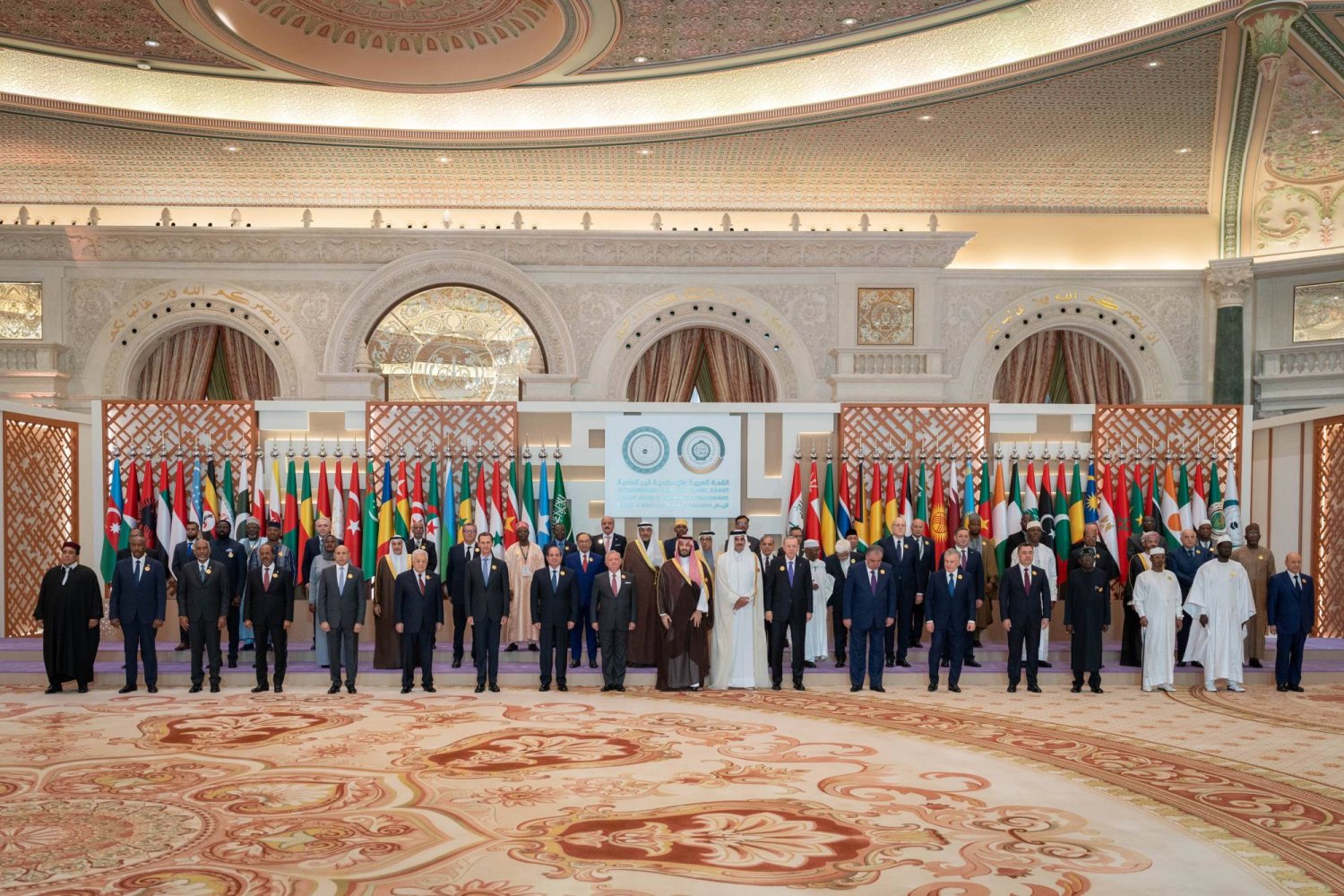The Gulf Cooperation Council’s Honeymoon
Asharq Al Awsat/Salman Aldossary
Wednesday, 19 Nov, 2014
For a period of 255 days the Gulf Cooperation Council (GCC) faced one of its worst crises, one which raised the likelihood of seeing some member states being pushed out of the organization.
The period of 255 days is the officially acknowledged one, at least, for the crisis which involved Saudi Arabia, the UAE and Bahrain on the one hand, and Qatar on the other. The three countries recalled their ambassadors from Doha, and—in an unprecedented move—froze bilateral relations, before the fog of the crisis cleared following Riyadh’s official announcement of the end of the dispute and Qatar’s return to the GCC’s embrace.
From the start of the crisis, several things were clearly visible: Qatar’s burning desire to end the dispute in any way possible, its recognition of many of the reservations expressed by the three countries and the need to avoid acting in an arrogant manner, and its signing of the Riyadh agreement mandating its non-interference in the affairs of other member states. This is not to mention the endless high-level official visits and the diplomatic messages being sent in all directions.
Indeed, Doha never stopped knocking on all doors, something which embarrassed the other three countries who said they wanted actions not words. Qatar’s desire to repair what was broken was strong. At the same time, there was the problem of the Qatari side not being able to earn the trust of the other three countries and convince them of its seriousness and ability to address the roots of the problem. After several attempts from Qatar to bridge the gap, and following the tug of war over guarantees that past violations would not be repeated, wise steps were required in order to guide the GCC out of one of its worst crises. The Custodian of the Two Holy Mosques King Abdullah Bin Abdulaziz took on the historic duty of resolving the crisis, not because he is the King of Saudi Arabia but, first and foremost, because he is the most senior member of the Gulf house.
“King Abdullah is the head of the Gulf family,” a Gulf minister told me when we spoke about the reconciliation. He added: “We have no doubts about his wisdom and we believe that he takes into account everyone’s interests, not just those of his own country.”
One question remains unanswered, however: Is the crisis over? Will the people of the Gulf innocently sing again, “Our Gulf region is united”?
It is premature to think that the crisis has been completely resolved. We should admit that only some of the roots of the problem have been addressed. In addition, some details remain vague. Perhaps the coming months will be sufficient to demonstrate if the good intentions that have been expressed about putting the GCC’s general interests above the narrow ones of its member states are genuine. It should not be overlooked, however, that this acute crisis produced fierce reactions that went beyond those of previous inter-Gulf disputes. This was the case when some sides, affiliated with some parties involved in the dispute, lashed out at certain states or figures. These incidents will definitely not be forgiven, no matter how hard those who were responsible for them try to reach out to their brothers. There is a big difference between disagreeing with someone and registering one’s position through objective criticism on the one hand, and throwing the worst insults at someone on the other. It is true that the Gulf states have overcome their political differences and are quite pragmatic, but they do not forget personal differences and the insults that accompany them.
The GCC will witness a honeymoon period in the run-up to its forthcoming annual summit, scheduled to take place in Doha in December. This year’s summit was threatened with cancellation for the first time since the GCC was founded in 1981. Who knows, the honeymoon may last throughout the next year as Qatar chairs and plays host to the organization’s ministerial meetings. Such a scenario would be enough to suggest that what happened recently was a passing storm. Or is the sky still cloudy?
It would be dangerous if the crisis returned and the wound opened once again, God forbid. In this case, the crisis would certainly be more extreme, dangerous, and complex than before, and would produce decisions whose impact no one will be able to comprehend.
May the honeymoon last forever! Nevertheless, wishes need to be accompanied by deeds.
شهر العسل الخليجي
سلمان الدوسري/الشرق الأوسط/تشرين الثاني/14
لمدة 255 يوما عاش مجلس التعاون الخليجي واحدة من أعنف أزماته، لم يكن مستبعدا مع هذه الأزمة أن نرى دولة وقد عُزلت خارجه.
مائتان وخمسة وخمسون يوما هي العمر الرسمي على الأقل، للخلاف الخليجي الثلاثي مع قطر، وأفرز سحب سفراء الرياض وأبوظبي والمنامة من الدوحة، وتجميدا للعلاقات الثنائية بشكل غير مسبوق، قبل أن تنفرج الغمة وتنقشع الأزمة، ويعلن رسميا من الرياض عن نهاية الخلاف، وعودة قطر لحضنها الخليجي الذي غردت عنه بعيدا.
من رصد الأزمة الخليجية القطرية منذ بدايتها، كان يرى بوضوح الرغبة القطرية الجامحة في إنهاء هذا الخلاف بأي صورة كانت. الاعتراف بكثير من التحفظات التي أبدتها الدول الثلاث وعدم المكابرة. التوقيع على اتفاق الرياض الذي يمنع تدخل أي دولة خليجية في شؤون دولة أخرى. زيارات رسمية على مستوى عال لا تنتهي. رسائل دبلوماسية في كل الاتجاهات.
فعلا لم تتوقف الدوحة يوما عن طرق كل الأبواب، وهو ما أحرج الدول الثلاث، التي ترى أنها تريد أفعالا وليس أقوالا. كانت الرغبة القطرية جامحة في إصلاح ما انكسر، وفي نفس الوقت كانت هناك مشكلة عدم قدرة الجانب القطري انتزاع ثقة الدول الثلاث وإقناعها بأنه جاد وقادر على إغلاق نوافذ الشر أساس المشكلة. ومع كثير من المحاولات القطرية لردم الهوة، وشد وجذب حول ضمان عدم تكرار أي من تجاوزات الماضي، كان لا بد من حكمة تأخذ بيد هذا المجلس من أخطر أزماته، وقد كان لها خادم الحرمين الشريفين، الذي – وللتاريخ – لم يتعامل مع الأزمة فقط لأنه ملك للسعودية، ولكنه تعامل معها أولا وأخيرا باعتباره كبير البيت الخليجي.
يقول لي وزير خليجي، تعليقاً على المصالحة: «الملك عبد الله هو رب العائلة الخليجية، لا نشك في حكمته، ونؤمن أنه يأخذ في الاعتبار مصلحة الجميع، وليس مصلحة بلاده فقط».
يبقى السؤال: هل انتهت الأزمة؟ وهل سيعود الخليجيون للغناء كما كانوا بكل براءة: «خليجنا واحد؟».
من السابق لأوانه اعتبار الأزمة طويت بالكامل، ولنعترف بأن هناك جذورا للمشكلة حُلَّ بعض منها، والبعض الآخر معلقا، وجزء ثالث لا يزال غامضا، ربما الأشهر القادمة تكون كفيلة باختبار حسن النيات لتغليب المصالح العامة، وليس المصالح الضيقة لدوله، مع عدم إغفال أن الأزمة العنيفة هذه أفرزت أيضا ردود فعل شرسة فاقت المتعارف عليه عند الخلاف بين الخليجيين، عندما فجر من هم محسوبون على بعض الأطراف في الخصومة، وما زالوا، ضد دولة ما أو شخصيات بعينها، وهذا بالتأكيد لن تغفره تلك الأطراف مهما مدت يدها لأشقائها. فرق كبير بين أن تختلف معي وتسجل موقفك بنقد موضوعي، وبين أن تشتمني بأبشع الأوصاف أو تطعنني. صحيح أن الخليجيين يتجاوزون الخلافات السياسية، ولديهم من البراغماتية الشيء الكثير، لكنهم لا ينسون الاختلافات الشخصية، وما يصاحبها من تعريض وشتائم.
سيعيش مجلس التعاون الخليجي في شهر عسل حتى انعقاد القمة الخليجية المقبلة في الدوحة في ديسمبر (كانون الأول) المقبل، والتي كانت مهددة بعدم الانعقاد لأول مرة منذ تأسيس المجلس عام 1981. من يدري قد يستمر شهر العسل وقطر تترأس هذه القمة طوال العام المقبل، وتستضيف اجتماعات اللجان الوزارية الخليجية، وشهر العسل هذا كاف لأن نستطيع القول إن الخلاف الخليجي كان سحابة صيف مرت وانتهت إلى غير رجعة، أم أن السماء لا تزال ملبدة بالغيوم؟
الخطير لو عادت الأزمة وانفتح الجرح مجدداً لا سمح الله، الأكيد أنها ستعود بأشد وأخطر وأعقد مما كانت، وستفرز قرارات لا أحد قادر على استيعاب تأثيراتها.
دعواتكم لأن يستمر شهر العسل ولا ينتهي أبداً، حتى لو كانت الأمنيات تحتاج أن تصاحبها أفعال أيضاً.




















